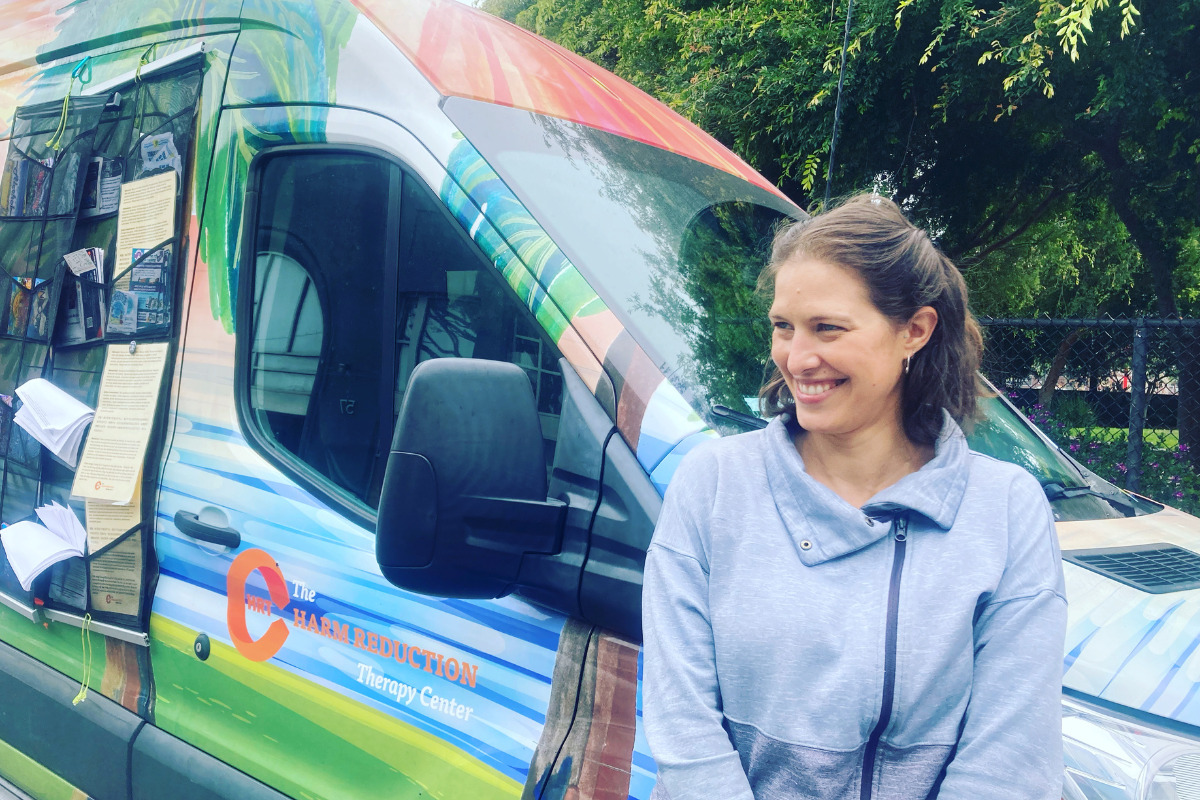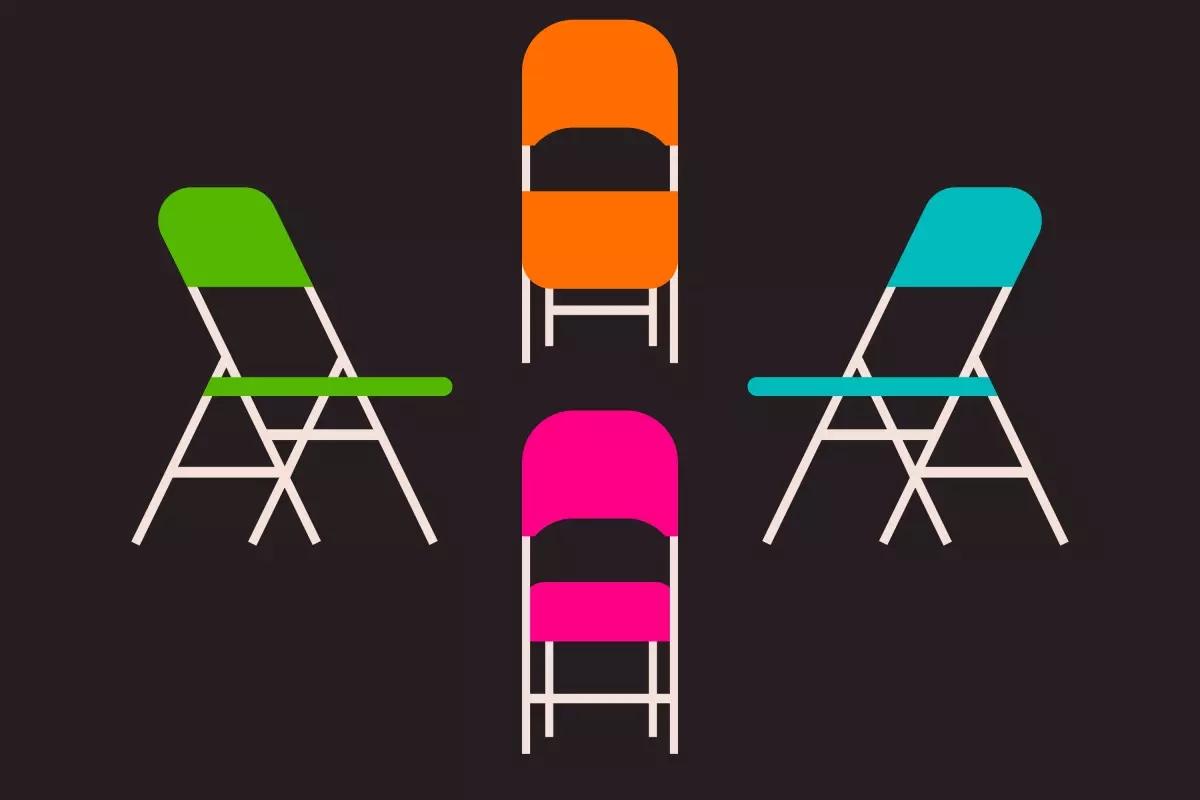HRTC’s Drop-in Center Celebrates its First Birthday! | |
|
Drop-in team
outside of Merlin.
| |
|
Nathan Kamps-Hughes, LCSW
Therapist & Program Manager
On any given day at 21 Merlin Street, HRTC’s low-barrier community mental health drop-in center, one will see folks engaging in a wide array of therapeutic and health-promoting activities. Moving freely throughout the space, drop-in center guests might choose to work on a piece of art, relax on a couch with a bowl of oatmeal, brush up on their overdose prevention strategies, plan their day over a cup of coffee, engage in an impromptu group with other guests about harm reduction, or discuss a goal or a desired change with an HRTC therapist.
| |
The fluidity and flexibility of the center, which is the living embodiment of HRTC’s “milieu” treatment model, allows for guests to avail themselves of whatever level of care makes the most sense for them in the moment. Perhaps unsurprisingly, we have consistently found that empowering individuals to set the agenda of their own healing process helps to both promote self-regulation AND uphold their right to self-determination. | |
|
And it is working. When we first launched our drop-in center back in December 2022, 1 or 2 folks might poke their heads in each day, get some snacks, and then leave. We now consistently receive 20-35 guests each day, many of whom spend several hours with us and engage in several levels of care during their stay. And while we make it clear to all that participation in treatment with an HRTC therapist is not a requirement to access our center, we have observed that more than 25% of drop-in guests actively seek out treatment with one of our providers. It is truly amazing how folks will spontaneously initiate treatment and develop their own treatment goals when you acknowledge their expertise, including the logic and legitimacy of their ambivalence. By offering a calm, welcoming and safe environment, without preconditions, without the burdensome amounts of paperwork, self-disclosure, vulnerability, and/or requirements around behavioral change frequently present in other mental health and substance use treatment environments, our guests form connections at the speed of trust with therapists, each other and themselves. Through engagement in a therapeutic milieu where they can work at their own pace, free of stigma, judgment and pre-conditions, people can reflect on their needs, hopes, and goals, including any decisions they may wish to make around change.
| |
 | |
HRTC believes in showing up for people, our people, in times of need and crisis. It is often systemic barriers that weigh more heavily on vulnerable, marginalized people and whenever possible, if we can offer needed services to people as they need them, we will. As overdose deaths continue to rise in San Francisco, we aim to be a part of the solution and will continue to work to bring needed, tailored services to people who use drugs.
To this end, we seek your partnership and support this Giving Tuesday as we work to offer the full range of connection and service options critical to people who use drugs. Even a modest donation will help us provide hot food, hygiene supplies and clothing to folks at the center. With robust support, we plan to staff our program at Merlin Street longer than the few hours per day we can currently manage–we can’t wait to be available to more people!
Thank you for your support of folks struggling with mental health, substance use and other basic needs–we at HRTC appreciate you.
| | | |
Drop-in center participants park their bikes while accessing services. | |
HRTC staff member James Pollet opening the center for the morning. | |
Art supplies and computers set up for use during drop-in. | |
HRTC International Connections | |
|
HRTC Joins the Consulate of Mexico for Community Outreach Event
Celia Sampayo Perez, LCSW, Clinical Director
On October 4th, Celia Sampayo Perez and Nathan Kamps-Hughes, both bilingual psychotherapists, met with the organizers from the Consulate of Mexico and Visión y Compromiso, as well as other community health providers, at Doulas Telar in the Mission district. This annual health fair, called XXIII Semana Binacional de Salud 2023 (XXIII SBS), started in 2001 to reach out to Spanish-speaking people in different parts of the United States where information on health resources and services are limited or hard to find. The main goal was to mobilize clinics and community organizations to offer resources, referrals and services on important health topics.
| |
The XXIII SBS focused on different health topics which included: mental health (immigration, isolation, and substance misuse), substance use awareness and the community impact of the War on Drugs, nutrition, STDs, vaccination centers, and access to health services. Using HRTC’s Mobile Service Team model, Celia and Nathan provided information, referrals and on-site services to several community members focused on harm reduction therapy and overdose prevention.
| |
|
Celia with representatives from
Visión y Compromiso
| |
|
Members of Zurich Delegation Visit
HRTC’s Merlin Street Space
| |
HRTC hosted members of the Zurich delegation for a 3 hour conversation on similarities and differences between Swiss and US drug policy, as well as Zurich and San Francisco drug policy and service practices. The Zurich delegation members were here to visit their sister city San Francisco and join in a panel discussion in the Mission District on drug policy. HRTC’s Director of Training & Business Operations, Maurice Byrd, LMFT also joined for the panel discussion. | |
HRTC team members Maurice Byrd, Celia Sampayo Perez and Anna Berg along with members of the Zurich delegation. | |
|
Site Spotlight: Cesar Chavez
Closure of San Francisco’s last Shelter-in-Place Safe Sleep Site
| |
|
Steven Estrada, ACSW , Staff Therapist
Joe Sciarrillo, LCSW, Staff Therapist
Since the Covid-19 pandemic hit San Francisco in 2020, HRTC has been providing therapy and harm reduction services at several City-sanctioned tent encampments called Safe Sleeping Sites. The last of these, the Shotwell Camp (or Cesar Chavez as we called it), remained open until October 31, 2023. Cesar Chavez was a unique site that received less service attention than others. Its location was also further from downtown service agencies and clinics, which made HRTC's presence there all the more valuable. Approximately 40 to 50 unhoused folks at a time lived there. HRTC therapists would visit for 2 hours every Friday and provided one-on-one therapy wherever clients preferred: in front of their tents, on nearby wooden benches, standing against the chain-link fence, or while sitting cross-legged on the pavement as their dogs played around us. We worked with clients to process trauma, to find inspiration, to mourn loved ones, to help get in touch with family, to access safer use supplies, to hold onto Narcan, to use Narcan, and referred over 30 folks to access medical care through the Street Medicine team. We facilitated emotional support animal and reasonable accommodation letters for new housing, and supported several advocacy efforts for residents to move into permanent housing. While the site was set up as a temporary resource for the unhoused to stay safe in tents as a response to the needs of the pandemic, the village environment created several strong bonds among residents who continue to stay friends and provide mutual aid to this day. HRTC continues to offer therapy and services to former residents at our van's mobile sites and at our drop-in center (21 Merlin St.).
| |
HRTC's mobile outreach van is parked at the entrance to the site, while therapists walked around the site on foot, meeting clients at their tents. | |
Photo from November 2022, when the site was at full capacity. 40 tents were lined up on raised platforms at the site. A senior housing high-rise building sits in the background, sharing a fence. | |
Only a few tents remained at the site on October 27, 2023, days before it closed. | |
 |
‘These are our people’: How a street-based therapy service is tackling San Francisco’s drugs crisis
Karin Goodwin
September 10, 2023
In a side street off a busy thoroughfare in San Francisco’s South of Market (SoMA) neighbourhood, dozens of people with nowhere else to go have set up home. There are tents and tarps, plywood and cardboard shelters, and trolleys full of belongings lining the alley, as traffic from the route 80 freeway thunders overhead.
For the last couple of years this street has also been home to the Harm Reduction Therapy Center (HRTC), a psychotherapy service with a difference, offering an open-door policy to people using drugs. There’s a reason they opened their first building-based drop-in centre right here.
“These are our people,” says director of programmes Anna Berg as she looks around at the encampment. “Being close, being able to be responsive to what folks are needing and to build community right where the community is… that’s what we like to do at HRTC.”
Read the full article HERE
| |  |
 |
AA isn’t the only way to change your relationship with alcohol. Here are other options
Laura Newberry
September 26, 2023
Over the past few decades, new recovery programs have emerged that provide an alternative to AA.
However, you should know that most of these also use an abstinence-only model. If you or a loved one finds that such a framework isn’t the right fit, I encourage you to look for local programs that emphasize harm reduction, which, put simply, are practices that meet people where they are, whether that’s a need for abstinence or something else. Harm reduction recognizes that all pathways to recovery are valid.
One such organization is the Harm Reduction Therapy Center, which primarily serves people experiencing homelessness in the San Francisco Bay Area. Though HRTC offers harm reduction therapy in more than a dozen locations, it’s best known for its mobile vans, or “clinics without walls.” These sites provide not just drop-in therapy, but water, food, first-aid supplies and harm reduction equipment like safe injection kits. Jason Brown, a staff therapist at HRTC, said that he might say hello to someone who grabs food at the van for a year before they’re ready to talk about their substance use.
Read the full article HERE
| | |
Mission harm reduction van offers clean needles, warm meals, massages
Ben Cohen
August 20th, 2023
Every Wednesday at 15th and Julian streets, you can spot the social workers and staff therapists with the Harm Reduction Center: They’re standing around a colorful van, blasting upbeat music, as patient after patient drops by for clean needles, free counseling, a warm meal — or even a massage.
Each week, from 2:30 to 5 p.m., the center’s staff is on deck for whoever needs to drop in and get treatment.
“We offer free therapy, integrated mental health and substance abuse treatment to folks who might not be able to access it in traditional ways,” said Anna Berg, director of programs at the center.
Read the full article HERE
| | |
HRTC T-shirts, Sweatshirts,
Books, Totes & Posters!
| | | | |